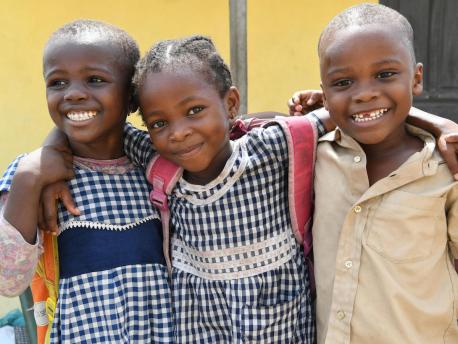
Celebrating Legislation on Education, Protection and Nutrition
Thanks in part to UNICEF supporters, three important pieces of legislation for the world's children are advancing toward a full House vote.
Over the past year, supporters and volunteers of UNICEF USA have been advocating for three significant pieces of legislation to bolster girls' education, prevent and respond to violence against children around the world, and reaffirm the importance of global nutrition. We are thrilled to share that the Keeping Girls in School Act (H.R.2153/S.1071), Resolution to End Violence Against Children Globally (H.Res.230/S.Res.112) and Global Nutrition Resolution (H.Res.189/S.Res.260) have passed the House Foreign Affairs Committee (HFAC).
Girls' Education
Globally, 130 million girls between the ages of 6 and 17 are out of school due to numerous barriers including child marriage, social discrimination, harassment and violence. The Keeping Girls in School Act seeks to address these barriers through smart investments and coordination between U.S. Government agencies. It also complements and builds on existing guidance and legislation on education and child marriage in U.S. foreign policy and programmatic efforts, codifying the U.S. Global Strategy to Empower Adolescent Girls. When we invest in educating young girls around the world, we invest in their economic growth and security, a strong workforce in the future and positive health outcomes for girls and their future children.
Violence Against Children
With 350 million children living in countries affected by conflict and crisis around the globe, children are increasingly becoming targets of war. In the past year, up to 1 billion children globally have experienced violence: as a result, a child dies every five minutes. The Resolution to End Violence Against Children Globally urges Congress to develop and implement a coordinated U.S. government strategy to prioritize the safety of children around the world and measure progress through a common set of measurements and indicators.
Global Nutrition
Unfortunately, malnutrition contributes 45 percent of all deaths of children under age 5. A well-nourished child has a better chance of learning, thriving and participating in her community. The Global Nutrition Resolution outlines the importance of United States leadership to accelerate global progress against maternal and child malnutrition while recognizing the need for the United States Agency for International Development (USAID) to provide improved and clear methods to tracking nutrition and food outcomes around the world.
Thanks in part to the tireless efforts of UNICEF USA advocates who met with their Members of Congress on Advocacy Day in Washington, D.C. and back home in district during August Congressional Recess, Members of the House Foreign Affairs Committee were influenced to mark up these three important pieces of legislation. The markup process allows for congressional subcommittees to debate, amend and rewrite proposed legislation.
Now that this key legislation has passed the Committee, what's next? All three will need to advance to the floor for a full House vote. Simultaneously, the Senate will need to mark up and pass their versions. With the House markup checked off, we have cleared one hurdle and are one step closer to seeing the Keeping Girls in School Act, Resolution to End Violence Against Children Globally and Global Nutrition Resolution become law.
This markup shows that Congress can come together in a bipartisan manner to help make the world a better place for children; and also shows the value of our UNICEF volunteers engaging with Congressional offices both in D.C. and locally to show constituent support for such legislation. — Mark Engman, UNICEF USA Managing Director, Public Policy and Advocacy
"This markup shows that Congress can come together in a bipartisan manner to help make the world a better place for children; and also shows the value of our UNICEF volunteers engaging with Congressional offices both in D.C. and locally to show constituent support for such legislation," said Mark Engman, UNICEF USA Managing Director, Public Policy and Advocacy.
We are thankful to our UNICEF UNITE supporters and volunteers for reaching out to their Members of Congress on behalf of the world's children and advocating to ensure they are provided with education, safety and healthy lives.
If you haven't reached out to your Representative or Senators yet, there's still time to make your voice heard. Visit UNICEF USA's Advocacy Action Center to speak out on current legislation in Congress.
Top photo: Girls and boys are getting a quality education at this UNICEF-supported school in Gonzagueville, a suburb of Abidjan, the capital of Côte d'Ivoire. © UNICEF/UN0288500/Dejongh
HOW TO HELP
There are many ways to make a difference
War, famine, poverty, natural disasters — threats to the world's children keep coming. But UNICEF won't stop working to keep children healthy and safe.
UNICEF works in over 190 countries and territories — more places than any other children's organization. UNICEF has the world's largest humanitarian warehouse and, when disaster strikes, can get supplies almost anywhere within 72 hours. Constantly innovating, always advocating for a better world for children, UNICEF works to ensure that every child can grow up healthy, educated, protected and respected.
Would you like to help give all children the opportunity to reach their full potential? There are many ways to get involved.



